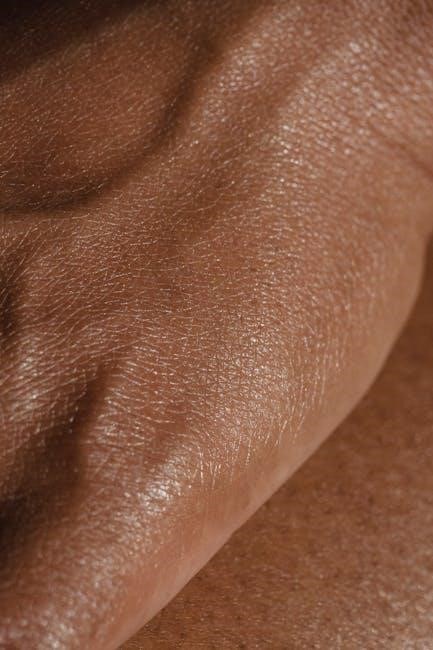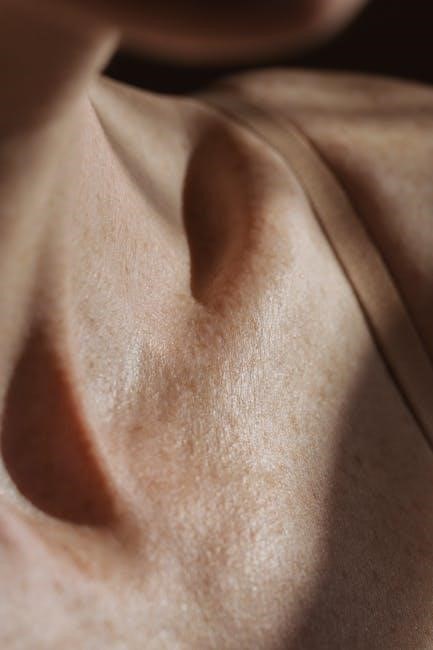The Theology of the Body‚ presented by Pope John Paul II‚ explores human sexuality and the body’s theological significance‚ offering a fresh perspective on love‚ marriage‚ and the divine plan.

Definition of the Theology of the Body

The Theology of the Body is a theological anthropology that explores the human body’s intrinsic connection to God’s divine plan. It emphasizes the body’s dignity and its role as a “theology” in itself‚ revealing God’s love and truth. Rooted in Scripture‚ particularly Christ’s teachings‚ this theology addresses human sexuality‚ relationships‚ and the sanctity of life. It transcends mere sexual morality‚ offering a holistic understanding of the body as a sacramental sign of God’s presence. Pope John Paul II’s groundbreaking work describes the body as a “theology” because it reflects divine love and communion. This teaching underscores the unity of body and soul‚ affirming the body’s role in expressing spiritual truths and fostering authentic human relationships. By examining the body’s purpose‚ the Theology of the Body provides a profound vision of human dignity‚ love‚ and the divine plan for humanity.
Background and Development

The Theology of the Body emerged from Pope John Paul II’s 129 Wednesday audiences between 1979 and 1984. These teachings‚ later compiled into a comprehensive work‚ were a response to modern challenges to human dignity and sexuality. Drawing from Scripture‚ tradition‚ and philosophy‚ John Paul II sought to counter the cultural and theological misunderstandings of the body. His approach was deeply influenced by earlier Christian thinkers‚ such as St. Augustine‚ who emphasized the interconnectedness of body and soul. The development of this theology was also shaped by the Second Vatican Council‚ which called for a renewed understanding of the human person. By integrating these sources‚ John Paul II crafted a theology that not only addressed contemporary issues but also provided a rich‚ biblical vision of human love and relationships. This foundational work continues to inspire theological reflection and pastoral application today.
Purpose and Significance
The Theology of the Body serves as a profound response to modern challenges regarding human dignity‚ love‚ and sexuality. Its purpose is to reveal the deepest meaning of the human body and its role in God’s plan. By emphasizing the body’s theological significance‚ John Paul II aimed to counter the dualistic tendencies that separate the body from the soul. This teaching underscores the body’s role in expressing divine love and truth‚ countering cultural distortions of human sexuality. Its significance lies in its ability to transform culture and society by promoting a vision of love rooted in self-gift and mutual respect. The Theology of the Body is not only a theological treatise but also a guide for ethical living‚ offering insights into marriage‚ celibacy‚ and human relationships. Its relevance extends to addressing contemporary issues‚ making it a vital resource for both theological education and pastoral care.

Historical Context
The Theology of the Body emerges from John Paul II’s synthesis of early Church Fathers‚ Augustine‚ and modern theological insights‚ bridging ancient and contemporary understandings of human sexuality and divine love.
Early Christian Influences
The Theology of the Body draws deeply from early Christian thought‚ particularly the writings of St. Augustine‚ who emphasized the dignity of the human person and the interconnectedness of body and soul. Augustine’s understanding of human nature‚ influenced by the Fall and redemption‚ underscores the body’s role in expressing God’s love. Early Church Fathers like St. Paul also shaped this theology‚ as seen in their teachings on the body as a temple of the Holy Spirit and the sacramental nature of marriage. These foundational ideas were later developed by John Paul II‚ who integrated them with modern theological insights to create a comprehensive vision of human sexuality and the body’s theological significance. The early Christian emphasis on the body as a sign of divine truth remains central to the Theology of the Body‚ highlighting its enduring relevance in understanding human existence and God’s plan.
Medieval Contributions
The medieval period enriched the Theology of the Body through the works of scholars like Thomas Aquinas‚ who integrated Aristotelian philosophy with Christian theology. Aquinas emphasized the body’s role in expressing divine truth‚ viewing it as an integral part of human nature. Mystics such as St. Bernard of Clairvaux also contributed by highlighting the union of the soul with God‚ which influenced later teachings on the body’s sacramental role. The medieval emphasis on sacramental theology‚ particularly in marriage‚ laid the groundwork for understanding the body as a sign of God’s covenantal love. These contributions provided a theological foundation for John Paul II’s teachings‚ blending philosophical rigor with spiritual insight. The medieval synthesis of faith and reason remains a cornerstone of the Theology of the Body‚ offering a rich framework for understanding human dignity and the body’s sacred purpose.

Key Teachings
The Theology of the Body highlights human dignity‚ the sacramentality of the body‚ and the nuptial meaning of human existence‚ emphasizing the body as a gift and a sign of divine love.
Human Sexuality as Theological Entity
The Theology of the Body presents human sexuality as a profound theological entity‚ deeply rooted in the divine plan. It emphasizes that the human body‚ created in the image of God‚ is a sacramental sign of divine love and communion. Sexuality is not merely a biological or emotional aspect but a theological one‚ revealing God’s plan for humanity. The body‚ as a gift from God‚ expresses the nuptial meaning of human existence‚ pointing to the union between God and humanity. This teaching highlights the dignity of the human person and the sanctity of relationships‚ calling for an integration of sexuality with spirituality. By exploring the biblical account of creation and the words of Christ‚ the Theology of the Body offers a holistic understanding of human love‚ marriage‚ and the body’s role in fulfilling God’s plan.
The Body’s Role in Theology
The Theology of the Body underscores the body’s central role in theology‚ emphasizing its sacred and symbolic significance. The human body‚ created in the image of God‚ is not merely a biological entity but a theological one‚ expressing divine truths and the mystery of God’s love. It is through the body that humanity experiences and expresses love‚ communion‚ and the divine plan. The body is a “sacramental” sign‚ pointing to the union between God and humanity‚ and it reveals the nuptial meaning of human existence. This teaching highlights the body’s dignity and its role in expressing spiritual realities‚ such as the union of Christ and the Church. By exploring the body’s theological dimension‚ the Theology of the Body integrates the physical and spiritual aspects of human life‚ offering a holistic understanding of the body’s purpose in God’s plan.

Modern Relevance
The Theology of the Body remains highly relevant today‚ offering insights into human sexuality‚ love‚ and the body’s theological significance. It addresses contemporary ethical dilemmas and cultural challenges‚ providing a moral framework for understanding relationships‚ marriage‚ and human dignity. By emphasizing the body’s sacredness and its role in expressing divine love‚ this theology counters secular views that reduce sexuality to mere physicality. Its teachings are particularly impactful in discussions about gender‚ identity‚ and the meaning of human existence. As society grapples with evolving norms‚ the Theology of the Body offers a timeless and transformative vision of human love and sexuality‚ rooted in Scripture and the divine plan.
Ethical Applications
The Theology of the Body provides a robust moral framework for addressing ethical issues related to human sexuality‚ marriage‚ and the body. It emphasizes the dignity of the human person and the sacredness of the body as a reflection of God’s love. This theology challenges secular views that reduce sexuality to mere physicality‚ instead advocating for a holistic understanding of human relationships rooted in mutual respect‚ self-gift‚ and fidelity. It offers ethical guidance on topics such as chastity‚ contraception‚ and the sanctity of life‚ promoting a vision of love that aligns with divine intent. By highlighting the body’s role in expressing divine love‚ the Theology of the Body critiques practices that dehumanize or exploit the body‚ calling for a culture of life and dignity. Its ethical applications are particularly relevant in addressing contemporary debates on gender‚ identity‚ and human flourishing.
Cultural Impact
The Theology of the Body has profoundly influenced contemporary Catholic thought and culture‚ reshaping discussions on human sexuality‚ marriage‚ and the body’s dignity. Its teachings have inspired movements promoting a renewed understanding of love and relationships‚ challenging secular norms that often reduce sexuality to mere physicality. The theology has also sparked debates within and beyond the Catholic Church‚ particularly on topics like gender identity‚ LGBTQ+ issues‚ and the sanctity of life. Study groups and resources‚ such as those found at theologyofthebody.net‚ have made this theology accessible to a wide audience‚ fostering grassroots engagement. George Weigel described it as a “theological time bomb‚” highlighting its potential to transform cultural and religious discourse. By emphasizing the body’s role in expressing divine love‚ the Theology of the Body continues to shape conversations on human flourishing and the integration of faith and culture in modern society.
Future Prospects
The Theology of the Body holds significant potential for future theological and cultural development. As society grapples with evolving views on human sexuality‚ gender‚ and relationships‚ this framework offers a compelling‚ faith-based perspective. Its emphasis on the body as a theological entity and the unity of love and sexuality provides a foundation for addressing modern ethical dilemmas. The integration of this theology into educational programs and pastoral care is expected to deepen its impact‚ fostering a holistic understanding of human dignity. Additionally‚ its relevance in interfaith dialogues and discussions on human rights could further its reach. By bridging the gap between sacred teachings and contemporary challenges‚ the Theology of the Body is poised to remain a vital resource for spiritual and cultural transformation in the decades to come‚ inspiring new generations to embrace its vision of love and life.
